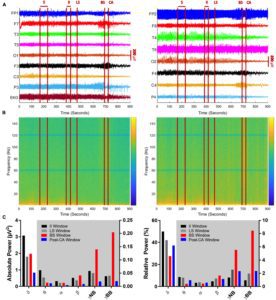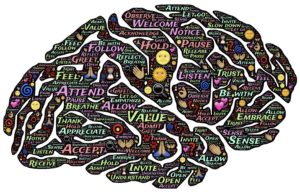
Neural activity can be measured in our brain when we die.
Thousands of accounts exist from those who died but lived to talk about it. Many of these people readily share their near-death experiences and often relay a similar story. They experience something called a life recall in which the totality of their collective life experience plays out in a flash before their eyes just before they die.
Now, a serendipitous medical moment may prove this notion to be scientifically true. An 87-year-old man hooked up to an EEG, or electroencephalogram, unexpectedly died of a heart attack. His recorded brain scan demonstrated an abundance of cognitive activity flourishing in his brain at the time of death. The study on this remarkable phenomenon was published in “Frontiers in Aging Neuroscience.”

An EEG of a dying brain showed a surprising amount of neural activity
Credit Frontiers in Aging Neuroscience
The patient was undergoing an EEG because he was having seizures following a traumatic brain injury. The researchers were taken by surprise at the man’s death. But this unforeseen incident revealed repetitive electrical impulses during the moments leading up to the patient’s death, as well as after his heart stopped beating. The noticeable change in brain function was captured for at least 30 seconds after he died. This too, surprised researchers.
Similar brain patterns have also been measured in rats that died in controlled studies. These patterns are called gamma oscillations or gamma brain waves. They are prominent when brain cells communicate quickly and intensely with each other. This high-level rhythmic activity is most associated with things like concentrating, dreaming, meditating, and memory retrieval. According to WebMD, these types of brain waves are also associated with a sense of pleasure or happiness.

Gamma brain waves benefit brain function and increase awareness during meditation.
Although science cannot rely on merely one man’s transition to decipher what happens to our brain when we die, the researchers are hopeful that a vivid recall or life recount is occurring. Dr. Ajmal Zemmar, the lead neurosurgeon for the study, stated in a press release announcing their findings: “Something we may learn from this research is: although our loved ones have their eyes closed and are ready to leave us to rest, their brains may be replaying some of the nicest moments they experienced in their lives.”

 What Happens to Our Brain When We Die?
What Happens to Our Brain When We Die?



 “As Tears Go By” by Marianne Faithfull
“As Tears Go By” by Marianne Faithfull
 “The Sea” by John Banville
“The Sea” by John Banville















